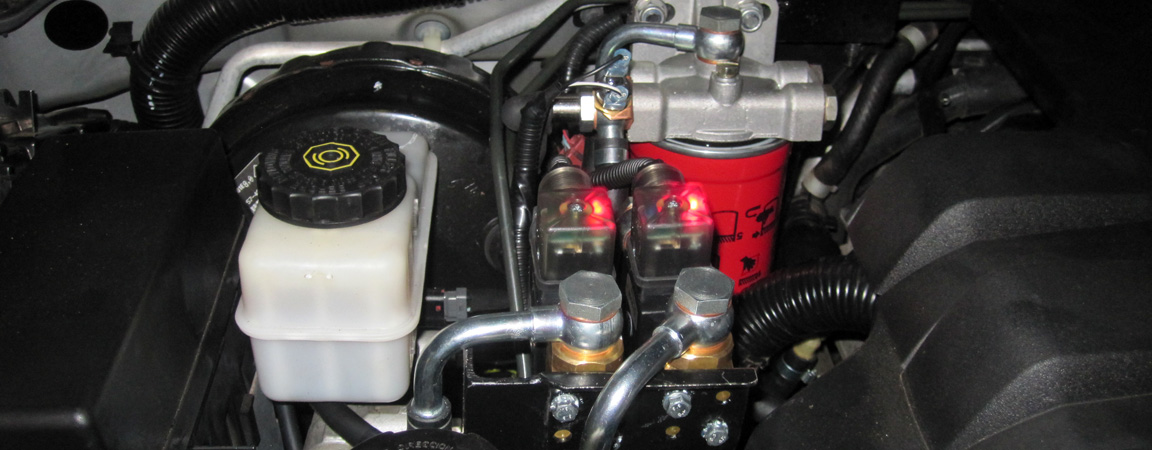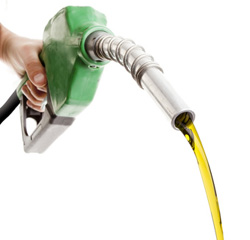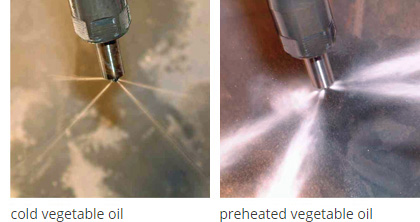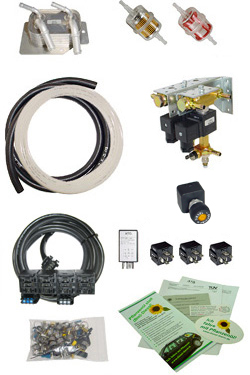ATG VEGETABLE OIL CONVERSION SYSTEM
Conversion of diesel engines and vehicles to vegetable oil operation

- Allows the operation of diesel engines with straight vegetable oil (SVO/PPO) or waste vegetable oil (WVO/UCO)
- Gentle engine start with dual-fuel system
- Operational safety due to auto switching and diesel quick purge
- Pure diesel operation still possible
- Proven technology – Made in Germany
- Suitable for diesel vehicles and diesel engines of all kinds: trucks, tractors, agricultural machinery, construction machinery, generators, etc.
Why vegetable oil?

In light of rising fuel prices and the climate change alternative fuels such as vegetable oil offer an economical and ecologically friendly alternative to conventional diesel fuel.
Straight vegetable oils (e.g. rapeseed oil, canola oil, soya oil, sunflower oil, jatropha oil, coconut oil, palm oil) are CO2-neutral, sulfur free and nontoxic. In addition to pure plant oils, the use of used cooking oils is also possible, provided they are cleaned and free from water.
Vegetable oils must not be confused with biodiesel (RME). Biodiesel is chemically processed and is much more expensive to produce.
Compared to fossil diesel fuel the consumption and engine power with vegetable oil remains nearly the same.
Why converting?

Pure vegetable oils or used cooking oils have a significantly higher viscosity and ignition temperature than diesel fuel and must therefore be heated to operate diesel engines.
Unheated vegetable oils lead to starting difficulties and have a negative effect on the performance and service life of the engine. Cold, viscous vegetable oil strains the injection system and burns incompletely. In the long term, unburnt fuel residues can lead to carbonized injectors and deposits in the combustion chamber of the engine.
At last for a long-term and smooth operation with vegetable oil the conversion of the engine is imperative.
The ATG Vegetable oil conversion system
The ATG VEGETABLE OIL CONVERSION SYSTEM (2-tank-system with fuel preheating) is a well proven solution for the operation of diesel engines with untreated vegetable oils.
The main components are
- Rotary switch with LED-display
- Electric switching unit for tank switching
- Electric fuel preheater
- Heat exchanger for cooling water circuit
- Control electronics for automatic changeover and diesel quick purge
- Pre-assembled cable loom
- Additional fuel tank (optional)
The additional fuel tank is available in various shapes and sizes (see fuel tanks) and can be installed at any suitable location.
The electric switching unit is used to switch between the fuel tanks and for flushing the fuel system.
In order to protect the cold engine and the injection system, the cold start is generally done with diesel fuel.
As soon as the engine reaches its operating temperature, it will be switched automatically to vegetable oil. There is a soft transition from diesel to vegetable oil.
The heat exchanger (fitted in cooling water circuit) heats in combination with the electric fuel preheater the vegetable oil to an optimum temperature. The heated fuel relieves the injection system and is finer atomized by the injectors. It ignites and burns more efficiently, resulting in fuel savings and less wear and tear on the engine.
As long as the motor has its operating temperature, it can be stopped and restarted in vegetable mode. Only when the engine is switched off for more than an hour, it should be switched back over to diesel mode before the end of operation. An automatically activated quick purge flushes the fuel and injection system shortly with diesel fuel and ensures a cold start without any problems.
To prevent an unintended engine stop in vegetable oil mode a short audio warning reminds to switch back to diesel when the engine is switched off.
Installation and scope of delivery
The ATG VEGETABLE OIL CONVERSION SYSTEM is available as 12 and 24 volt version for various engine performance classes (up to 75 kW, 150 kW, 250 kW, 500 kW).
All relevant components are included in the scope of delivery:
Rotary switch with LED display, electric switching unit (tank switching, flushing/venting) with integrated electric fuel preheater DIESELTHERM, temperature switch (temperature control), control electronics (diesel quick purge, acoustic warning), heat exchanger (fitted in cooling water circuit), fuel lines, fuel prefilter, relays, pre-assembled wiring harness with connectors, fuses and protective caps, miscellaneous materials, detailed installation instructions
References
With over 20 years of experience, ATG is a leading supplier in the field of vegetable oil conversion. In the meantime, several thousand diesel vehicles and engines from a wide range of manufacturers have been converted with the tried and tested ATG VEGETABLE OIL CONVERSION SYSTEM.
-
trucks: DAF, MAN, Mercedes-Benz, Neoplan, Iveco, Renault, Scania, Setra, Volvo
-
tractors, agricultural and construction machinery: AGCO, Case IH, CAT, Claas, Deutz-Fahr, Fendt, Fiat, IHC, JCB Fastrac, John Deere, Lamborghini, Massey Ferguson, MB-Trac, New Holland, Pasquali, Renault, Same, Steyr
-
stationary engines, generators and CHPs (combined heat and power plants): CAT, Deutz, Fiat Powertrain FPT, Iveco, John Deere, Kubota, Lister Petter, Lombardini, Mitsubishi, MWM, Perkins, Scania, Volvo, Volvo Penta, Yanmar

